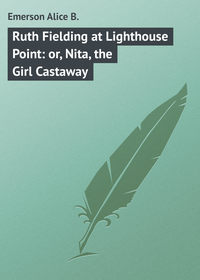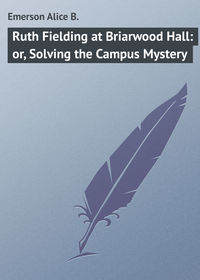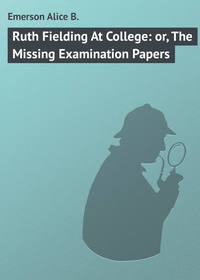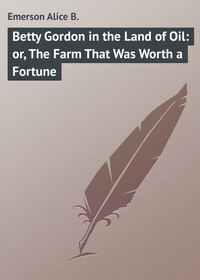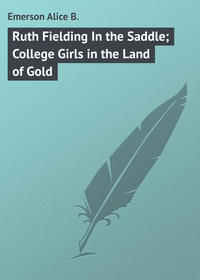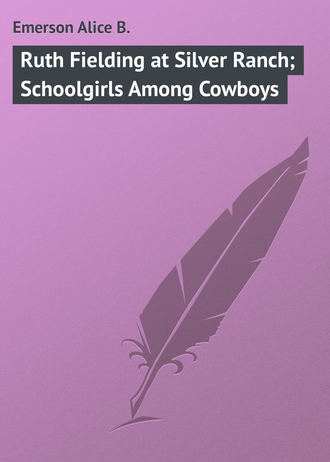 полная версия
полная версияRuth Fielding at Silver Ranch; Schoolgirls Among Cowboys

Emerson Alice B.
Ruth Fielding at Silver Ranch / Schoolgirls Among Cowboys
CHAPTER I – “OLD TROUBLE-MAKER”
Where the Silver Ranch trail branches from the state road leading down into Bullhide, there stretch a rambling series of sheds, or “shacks,” given up to the uses of a general store and provision emporium; beside it is the schoolhouse. This place on the forked trails is called “The Crossing,” and it was the only place nearer than the town of Bullhide where the scattered population of this part of Montana could get any supplies.
One of Old Bill Hicks’ herds was being grazed on that piece of rolling country, lying in the foothills, right behind the Crossing, and two of his cow punchers had ridden in for tobacco. Being within sight of rows upon rows of tinned preserves (the greatest luxury extant to the cowboy mind), and their credit being good with Lem Dickson, who kept the store, the two cattle herders – while their cayuses stood with drooping heads, their bridle-reins on the road before them – each secured a can of peaches, and sitting cross-legged on the porch before the store, opened the cans with their knives and luxuriated in the contents.
“Old man’s nigh due, ain’t he?” asked Lem, the storekeeper, lowering himself into a comfortable armchair that he kept for his own particular use on the porch.
“Gittin’ to Bullhide this mawnin’,” drawled one of the cowboys. “An’ he’s got what he went for, too.”
“Bill Hicks most usually does git what he goes after, don’t he?” retorted the storekeeper.
The other puncher chuckled. “This time Old Bill come near goin’ out after rabbit an’ only bringin’ back the hair,” he said. “Jane Ann is just as much of a Hicks as Bill himself – you take it from me. She made her bargain b’fore Old Bill got her headed back to the ranch, I reckon. Thar’s goin’ to be more newfangled notions at Silver Ranch from now on than you kin shake a stick at. You hear me!”
“Old Bill can stand scattering a little money around as well as any man in this State,” Lem said, ruminatively. “He’s made it; he’s saved it; now he might’s well l’arn to spend some of it.”
“And he’s begun. Jane Ann’s begun for him, leastways,” said one of the cowboys. “D’ye know what Mulvey brought out on his wagon last Sat’day?”
“I knowed he looked like pitchers of ‘movin’ day’ in New York City, or Chicago, when he passed along yere,” grunted the storekeeper. “Eight head o’ mules he was drivin’.”
“He sure was,” agreed the cow puncher. “There was all sorts of trucks and gew-gaws. But the main thing was a pinanner.”
“A piano?”
“That’s what I said. And that half-Injun, Jib Pottoway, says he kin play on the thing. But it ain’t to be unboxed till the boss and Jane Ann comes.”
“And they’ll be gittin’ along yere some time to-day,” said the other cowboy, throwing his empty tin away. “And when they come, Lem, they’re sure goin’ to surprise yuh.”
“What with?”
“With what they sail by yere in,” drawled the puncher.
“Huh? what’s eatin’ on you, Bud? Old Bill ain’t bought an airship, has he?”
“Mighty nigh as bad,” chuckled the other. “He’s bought Doosenberry’s big automobile, I understand, and Jane Ann’s brought a bunch of folks with her that she met down East, and they’re just about goin’ to tear the vitals out o’ Silver Ranch – now you hear me!”
“A steam wagon over these trails!” grunted the storekeeper. “Waal!”
“And wait till Old Bill sees a bunch of his steers go up in the air when they sets eyes on the choo-choo wagon,” chuckled Bud. “That’ll about finish the automobile business, I bet yuh!”
“Come on, Bud!” shouted his mate, already astride his pony.
The two cowboys were off and lashing their ponies to a sharp run in half a minute. Scarcely had they disappeared behind a grove of scrub trees on the wind-swept ridge beyond the store when the honk of an automobile horn startled the slow-motioned storekeeper out of his chair.
A balloon of dust appeared far down the trail. Out of this there shot the long hood of a heavy touring car, which came chugging up the rise making almost as much noise as a steam roller. Lem Dickson shuffled to the door of the store and stuck his head within.
“Sally!” he bawled. “Sally!”
“Yes, Paw,” replied a sweet, if rather shrill, voice from the open stairway that led to the upper chamber of the store-building.
“Here comes somebody I reckon you’ll wanter see,” bawled the old man.
There was a light step on the stair; but it halted on the last tread and a lithe, red-haired, peachy complexioned girl looked into the big room.
“Well, now, Paw,” she said, sharply. “You ain’t got me down yere for that bashful Ike Stedman, have you? For if he’s come prognosticating around yere again I declare I’ll bounce a bucket off his head. He’s the biggest gump!”
“Come on yere, gal!” snapped her father. “I ain’t said nothin’ about Ike. This yere’s Bill Hicks an’ all his crowd comin’ up from Bullhide in a blamed ol’ steam waggin.”
Sally ran out through the store and reached the piazza just as the snorting automobile came near and slowed down. A lithe, handsome, dark girl was at the wheel; beside her was a very pretty, plump girl with rosy cheeks and the brightest eyes imaginable; the third person crowded into the front seat was a youth who looked so much like the girl who was running the machine that they might have changed clothes and nobody would have been the wiser – save that Tom Cameron’s hair was short and his twin sister, Helen’s, was long and curly. The girl between the twins was Ruth Fielding.
In the big tonneau of the car was a great, tall, bony man with an enormous “walrus” mustache and a very red face; beside him sat a rather freckled girl with snapping black eyes, who wore very splendid clothes as though she was not used to them. With this couple were a big, blond boy and three girls – one of them so stout that she crowded her companions on the seat into their individual corners, and packed them in there somewhat after the nature of sardines in a can.
“Hello, Sally!” cried the girl in the very fine garments, stretching her hand out to greet the storekeeper’s daughter as the automobile came to a stop.
“Hi, Lem!” bawled the man with the huge mustache. “Is Silver Ranch on the map yet, or have them punchers o’ mine torn the face of Nater all to shreds an’ only left me some o’ the pieces?”
“I dunno ‘bout that, Bill,” drawled the fat storekeeper, shuffling down the steps in his list slippers, and finally reached and shaking the hand of Mr. William Hicks, owner of Silver Ranch. “But when some of your cows set their eyes on this contraption they’re goin’ to kick holes in the air – an’ that’s sartain!”
“The cows will have to get used to seeing this automobile, Lem Dickson,” snapped the ranchman’s niece, who had been speaking with Sally. “For uncle’s bought it and it beats riding a cayuse, I tell you!”
“By gollies!” grunted Bill Hicks, “it bucks wuss’n any critter I ever was astride of.” But he spoke softly, and nobody but the storekeeper noticed what he said.
“Mean to say you’ve bought this old chuck-waggin from Doosenberry?” demanded the storekeeper.
“Uh-huh,” nodded Mr. Hicks.
“Wal, you’re gittin’ foolish-like in your old age, Bill,” declared his friend.
“No I ain’t; I’m gittin’ wise,” retorted the ranchman, with a wide grin.
“How’s that?”
“I’m l’arnin’ how to git along with Jane Ann,” declared Mr. Hicks, with a delighted chortle, and pinching the freckled girl beside him.
“Ouch!” exclaimed his niece. “What’s the matter, Uncle Bill?”
“He says he’s bought this contraption to please you, Jane Ann,” said the storekeeper. “But what’ll Old Trouble-Maker do when he sees it – heh?”
“Gee!” ejaculated the ranchman. “I never thought o’ that steer.”
“I reckon Old Trouble-Maker will have to stand for it,” scoffed the ranchman’s niece, tossing her head. “Now, Sally, you ride out and see us. These girls from down East are all right. And we’re going to have heaps of fun at Silver Ranch after this.”
Helen Cameron touched a lever and the big car shot ahead again.
“She’s a mighty white girl, that Sally Dickson,” declared Jane Ann Hicks (who hated her name and preferred to be called “Nita”). “She’s taught school here at the Crossing for one term, too. And she’s sweet in spite of her peppery temper – ”
“What could you expect?” demanded the stout girl, smiling all over her face as she looked back at the red-haired girl at the store. “She has a more crimson topknot than the Fox here – ”
There came a sudden scream from the front seat of the automobile. The car, under Helen Cameron’s skillful manipulation, had turned the bend in the trail and the chapparel instantly hid the store and the houses at the Crossing. Right ahead of them was a rolling prairie, several miles in extent. And up the rise toward the trail was coming, in much dust, a bunch of cattle, with two or three punchers riding behind and urging the herd to better pasture.
“Oh! see all those steers,” cried Ruth Fielding. “Do you own all of them, Mr. Hicks?”
“I reckon they got my brand on ’em, Miss,” replied the ranchman. “But that’s only a leetle bunch – can’t be more’n five hundred – coming up yere. I reckon, Miss Helen, that we’d better pull up some yere. If them cows sees us – ”
“See there! see there!” cried the stout girl in the back seat.
As she spoke in such excitement, Helen switched off the power and braked the car. Out of the chapparel burst, with a frantic bellow, a huge black and white steer – wide horned, ferocious of aspect – quite evidently “on the rampage.” The noise of the passing car had brought him out of concealment. He plunged into the trail not ten yards behind the slowing car.
“Goodness me!” shouted the big boy who sat beside Bill Hicks and his niece. “What kind of a beast is that? It’s almost as big as an elephant!”
“Oh!” cried the girl called “The Fox.” “That surely isn’t the kind of cattle you have here, is it? He looks more like a buffalo. See! he’s coming after us!”
The black and white steer did look as savage as any old buffalo bull and, emitting a bellow, shook his head at the automobile and began to cast the dust up along his flanks with his sharp hoofs. He was indeed of a terrifying appearance.
“It’s Old Trouble-Maker!” cried Jane Ann Hicks.
“He looks just as though his name fitted him,” said Tom Cameron, who had sprung up to look back at the steer.
At that moment the steer lowered his head and charged for the auto. The girls shrieked, and Tom cried:
“Go ahead, Nell! let’s leave that beast behind.”
Before his sister could put on speed again, however, the big boy, who was Bob Steele, sang out:
“If you go on you’ll stampede that herd of cattle – won’t she, Mr. Hicks? Why, we’re between two fires, that’s what we are!”
“And they’re both going to be hot,” groaned Tom. “Why, that Old Trouble-Maker will climb right into this car in half a minute!”
CHAPTER II – BASHFUL IKE
The situation in the big automobile was quite as serious as Tom and Bob believed, and there was very good reason for the girls to express their fright in a chorus of screams. But Ruth Fielding, and her chum, Helen, on the front seat, controlled themselves better than the other Eastern girls; Jane Ann Hicks never said a word, but her uncle looked quite as startled as his guests.
“I am sartainly graveled!” muttered the ranchman, staring all around for some means of saving the party from disaster. “Hi gollies! if I only had a leetle old rope now – ”
But he had no lariat, and roping a mad steer from an automobile would certainly have been a new experience for Bill Hicks. He had brought the party of young folk out to Montana just to give his niece pleasure, and having got Ruth Fielding and her friends here, he did not want to spoil their visit by any bad accident. These young folk had been what Bill Hicks called “mighty clever” to his Jane Ann when she had been castaway in the East, and he had promised their friends to look out for them all and send them home in time for school in the Fall with the proper complement of legs and arms, and otherwise whole as to their physical being.
Ruth Fielding, after the death of her parents when she was quite a young girl, had left Darrowtown and all her old friends and home associations, to live with her mother’s uncle, at the Red Mill, on the Lumano River, near Cheslow in York State. Her coming to Uncle Jabez Potter’s, and her early adventures about the mill, were related in the first volume of this series, entitled “Ruth Fielding of the Red Mill; Or, Jasper Parloe’s Secret.”
Ruth had found Uncle Jabez very hard to get along with, for he was a miser and his kinder nature had been crusted over by years of hoarding and selfishness; but through a happy turn of circumstances Ruth was enabled to get at the heart of her crotchety old uncle, and when Ruth’s dearest friend, Helen Cameron, planned to go to boarding school, Uncle Jabez was won over to the scheme of sending the girl with her. The fun and work of that first term at school is related in the second volume of the series, entitled “Ruth Fielding at Briarwood Hall; Or, Solving the Campus Mystery.”
For the mid-winter vacation Ruth accompanied Helen and other school friends to Mr. Cameron’s hunting camp, up toward the Canadian line. In “Ruth Fielding at Snow Camp; Or, Lost in the Backwoods,” the girls and some of their boy friends experience many adventures and endure some hardship and peril while lost in the snow-shrouded forest.
One of Ruth’s chums, Jennie Stone, otherwise known as “Heavy,” invited her to Lighthouse Point, with a party of young people, for part of the summer vacation; and although Uncle Jabez was in much trouble over his investment in the Tintacker Mine, which appeared to be a swindle, the old miller had allowed Ruth to accompany her friends to the seashore because he had already promised her the outing. In “Ruth Fielding at Lighthouse Point; Or, Nita, the Girl Castaway,” is narrated all the fun and delightful experiences the girl of the Red Mill and her friends had at the seaside; including the saving of a girl from the wreck of a lumber schooner, a miss who afterward proved to be Jane Ann Hicks, the niece of a very wealthy Montana ranch owner. The girl had run away from the ranch and from her guardian and calls herself Nita, “because the girl in the paper-covered novel was called Nita.”
That was just the sort of a romantic, foolish girl Jane Ann Hicks was; but she learned a few things and was glad to see her old uncle, rough as he was, when he came hunting for her. And Mr. Bill Hicks had learned a few things, too. He had never seen people spend money before he came East, and he had not understood Jane Ann’s longing for the delicate and beautiful things in life. He saw, too, that a girl could not be properly brought up on a cattle ranch, with nothing but cow punchers and Indians and Mexican women about, and Mr. Hicks had determined to give his niece “a right-down good time,” as he expressed it.
It was to give Jane Ann pleasure, and because of the kindness of Ruth and her friends to his niece, that Mr. Bill Hicks had arranged this trip West for the entire party, on a visit to Silver Ranch. But the old gentleman did not want their introduction to the ranch to be a tragedy. And with the herd of half-wild cattle ahead, and Old Trouble-Maker thundering along the trail behind the motor car, it did look as though the introduction of the visitors to the ranch was bound to be a strenuous one.
“Do go ahead, Helen!” cried Madge Steele, Bob’s elder sister, from the back seat of the tonneau. “Why, that beast may climb right in here!”
Helen started the car again; but at that her brother and Ruth cried out in chorus:
“Don’t run us into the herd, Helen!”
“What under the sun shall I do?” cried Miss Cameron. “I can’t please you all, that’s sure.”
“Oh, see that beast!” shrieked The Fox, who was likewise on the back seat. “I want to get out!”
“Then the brute will catch you, sure,” said Bob Steele.
“Sit still!” commanded Mr. Hicks. “And stop the car, Miss! Better to be bunted by Old Trouble-Maker than set that whole bunch off on a stampede.”
“Mercy me!” cried Mary Cox. “I should think it would be better to frighten those cows in front than to be horned to death by this big beast from the rear.”
“Sit still,” said Jane Ann, grimly. “We won’t likely be hurt by either.”
Old Trouble-Maker did look awfully savage. Bellowing with rage, he thundered along after the car. Helen had again brought the automobile to a stop, this time at Bill Hicks’ command. The next moment the girls screamed in chorus, for the car jarred all over.
Crash went a rear lamp. About half a yard of paint and varnish was scraped off, and the car itself was actually driven forward, despite the brake being set, by the sheer weight of the steer.
“If we could git the old cart turned around and headed the other way!” groaned the ranchman.
“I believe I can turn it, Mr. Hicks,” cried Helen, excitedly.
But just then the steer, that had fallen back a few yards, charged again. “Bang!” It sounded like the exploding of a small cannon. Old Trouble-Maker had punctured a rear tire, and the car slumped down on that side. Helen couldn’t start it now, for the trail was too rough to travel with a flattened tire.
The black and white steer, with another furious bellow, wheeled around the back of the car and then came full tilt for the side. Heavy screamed at the top of her voice:
“Oh, take me home! I never did want to go to a dairy farm. I just abominate cows!”
But the crowd could not laugh. Huddled together in the tonneau, it looked as though Old Trouble-Maker would certainly muss them up a whole lot! Jane Ann and her uncle hopped out on the other side and called the others to follow. At that moment, with a whoop and a drumming of hoofs, a calico cow pony came racing along the trail toward the stalled car. On the back of this flying pony was a lanky, dust-covered cowboy, swinging a lariat in approved fashion.
“Hold steady, boss!” yelled this apparition, and then let the coils of the rope whistle through the air. The hair line uncoiled like a writhing serpent and dropped over the wide-spread horns of Old Trouble-Maker. Then the calico pony came to an abrupt halt, sliding along the ground with all four feet braced.
“Zip!” the noose tightened and the steer brought up with a suddenness that threatened to dislocate his neck. Down the beast fell, roaring a different tune. Old Trouble-Maker almost turned a somersault, while Jane Ann, dancing in delight, caught off her very modern and high-priced hat and swung it in the air.
“Hurrah for Bashful Ike!” she shouted. “He’s the best little old boy with the rope that ever worked for the Silver outfit. Hurrah!”
CHAPTER III – IN WHICH THINGS HAPPEN
The cow puncher who had rescued them was a fine looking, bronzed fellow, with heavy sheepskin chaps on his legs, a shirt open at the throat, his sleeves rolled up displaying muscular arms, and twinkling eyes under the flapping brim of his great hat. While he “snubbed” the big steer to his knees again as the bellowing creature tried to rise, he looked down with a broad smile upon the sparkling face of the Western girl.
“Why, bless yo’ heart, honey,” he said, in a soft, Southern droll, “if you want me to, I’ll jest natwcher’ly cinch my saddle on Old Trouble-Maker an’ ride him home for yo’. It certainly is a cure for sore eyes to see you again.”
“And I’m glad to see you, Ike. And these are all my friends. I’ll introduce you and the boys to them proper at the ranch,” cried the Western girl.
“Git that bellowin’ critter away from yere, Ike,” commanded Mr. Hicks. “I ’low the next bunch that goes to the railroad will include that black and white abomination.”
“Jest so, Boss,” drawled his foreman. “I been figurin’ Old Trouble-Maker better be in the can than on the hoof. He’s made a plumb nuisance of himself. Yo’ goin’ on, Boss? Bud and Jimsey’s got that bunch out o’ the way of your smoke-waggin.”
“We’ve got to shift tires, Mr. Hicks,” said Tom Cameron, who, with his chum, Bob Steele, was already jacking up the rear axle. “That steer ripped a long hole in this tire something awful.”
Bashful Ike – who didn’t seem at all bashful when it came to handling the big black and white steer – suddenly let that bellowing beast get upon his four feet. Then he swooped down upon the steer, gathering up the coils of his rope as he rode, twitched the noose off the wide horns, and leaning quickly from his saddle grabbed the “brush” of the steer’s tail and gave that appendage a mighty twist.
Bellowing again, but for an entirely different reason, the steer started off after the bunch of cattle now disappearing in the dust-cloud, and the foreman spurred his calico pony after Old Trouble-Maker, yelling at the top of his voice at every jump of his pony:
“Ye-ow! ye-ow! ye-ow!”
“I declare I’m glad to see those cattle out of the way,” said Helen Cameron, with a sigh.
“I believe you,” returned Ruth, who was still beside her on the front seat. “I just didn’t realize before that cattle on the range are a whole lot different from a herd of cows in an eastern pasture.”
Tom and Bob got the new tire in place and pumped up, and then the automobile started again for the ranch house. Jane Ann was quite excited over her home-coming; anybody could see that with half an eye. She clung to her uncle’s hand and looked at him now and again as though to assure the old fellow that she really was glad to be home.
And Bill Hicks himself began to “fill into the picture” now that he was back in Montana. The young folks had seen many men like him since leaving Denver.
“Why, he’s just an old dear!” whispered Ruth to Helen, as the latter steered the car over the rough trail. “And just as kind and considerate as he can be. It’s natural chivalry these Western men show to women, isn’t it?”
“He’s nice,” agreed Helen. “But he never ought to have named his niece ‘Jane Ann.’ That was a mean trick to play on a defenseless baby.”
“He’s going to make it up to her now,” chuckled Tom, who heard this, being on the front seat with the two chums. “I know the ‘pinanner’ has gone on ahead, as he promised Nita. And carpets and curtains, too. I reckon this ranch we’re coming to is going to ‘blossom like the rose.’”
When they came in sight of Silver Ranch, just before evening, the guests from the East were bound to express their appreciation of the beauty of its surroundings. It was a low, broad verandahed house, covering a good deal of ground, with cookhouses and other outbuildings in the rear, and a big corral for the stock, and bunkhouses for the men. It lay in a beautiful little valley – a “coulie,” Jane Ann, or Nita, called it – with green, sloping sides to the saucer-like depression, and a pretty, winding stream breaking out of the hollow at one side.
“I should think it would be damp down there,” said Madge Steele, to the ranchman. “Why didn’t you build your house on a knoll?”
“Them sidehills sort o’ break the winds, Miss,” explained Mr. Hicks. “We sometimes git some wind out yere – yes, ma’am! You’d be surprised.”
They rode down to the big house and found a wide-smiling Mexican woman waiting for them on the porch. Jane Ann greeted her as “Maria” and Hicks sent her back to the kitchen to hurry supper. But everybody about the place, even Maria’s husband, the “horse wrangler,” a sleek looking Mexican with rings in his ears and a broken nose, found a chance to welcome the returned runaway.
“My! it’s great to be a female prodigal, isn’t it?” demanded Heavy, poking Jane Ann with her forefinger. “Aren’t you glad you ran away East?”
The Western girl took it good-naturedly. “I’m glad I came back, anyway,” she acknowledged. “And I’m awfully glad Ruth and Helen and you-all could come with me.”
“Well, we’re here, and I’m delighted,” cried Helen Cameron. “But I didn’t really expect either Ruth or Mary Cox would come. Mary’s got such trouble at home; and Ruth’s uncle is just as cross as he can be.”
Ruth heard that and shook her head, for all the girls were sitting on the wide veranda of the ranch-house after removing the traces of travel and getting into the comfortable “hack-about” frocks that Jane Ann had advised them to bring with them.


